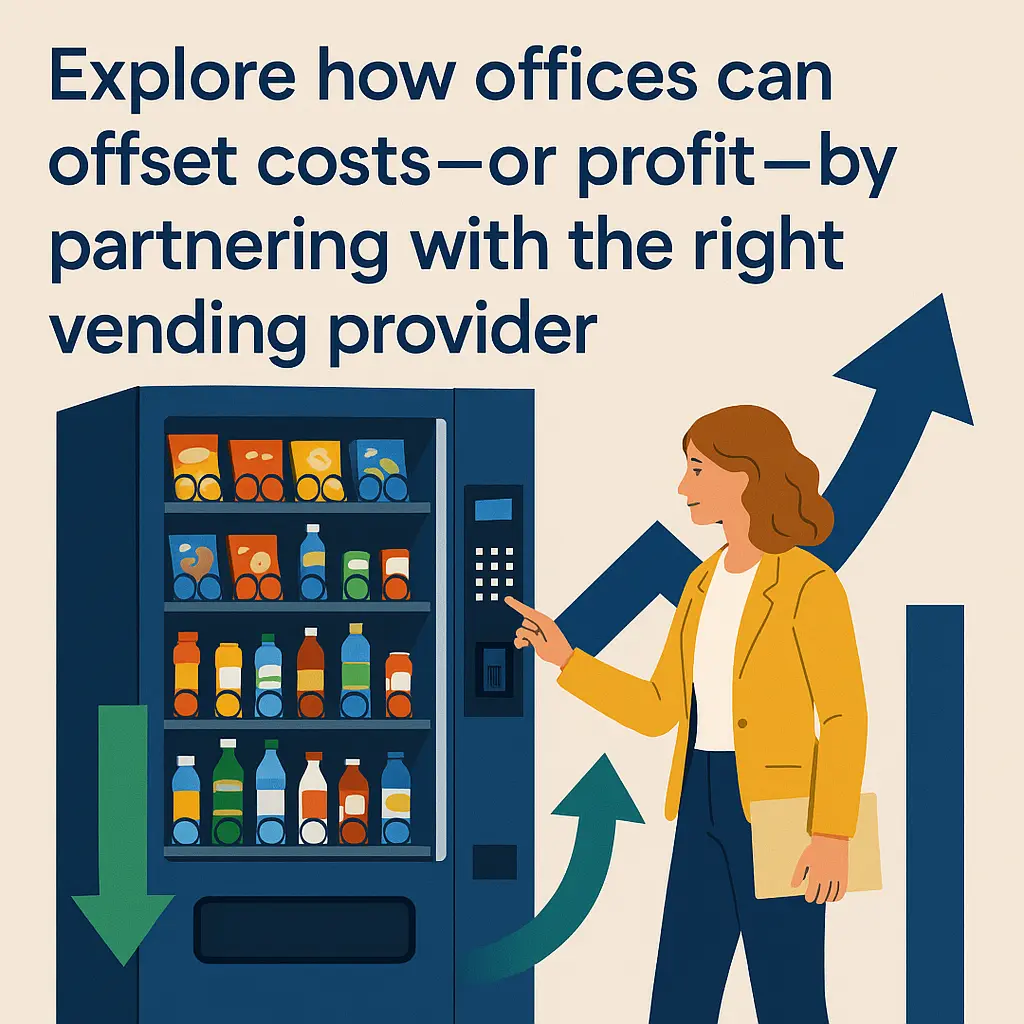Can You Make Money with Office Vending Machines?
Explore how offices can offset costs—or profit—by partnering with the right vending provider.
Back to Office Vending Services ResourcesExplore how offices can offset costs—or profit—by partnering with the right vending provider.
Back to Office Vending Services ResourcesYes. Many vending providers offer revenue share programs based on machine usage. The more your employees or tenants use the machine, the more your business earns—typically as a percentage of sales.
![]() Shared profit options can help offset workplace amenity costs
Shared profit options can help offset workplace amenity costs
![]() Smart machines with contactless pay can boost user engagement
Smart machines with contactless pay can boost user engagement
![]() High-traffic areas can turn vending into passive revenue
High-traffic areas can turn vending into passive revenue

Office vending machines don’t just provide convenience—they can also generate revenue, if set up with the right provider. Many businesses install machines to offer snacks or drinks to staff and visitors, but with high-traffic locations and a solid vending partner, they can also earn commissions from each sale. Understanding how the vending business model works helps determine whether it’s a cost-saving or income-producing opportunity for your workplace.
Most vending providers offer one of two setups: full-service with free installation and restocking, or a managed agreement with potential revenue sharing. In a full-service model, the vendor retains all profits and covers all costs—making it ideal for locations that want a hands-off amenity. However, for offices with consistent foot traffic or high employee engagement, many vendors offer commission models. In these cases, the office earns a percentage (typically 5-20%) of product sales, paid out monthly or quarterly.
Of course, consistent service is key to maximizing earnings. Machines must be stocked, clean, and operational. Poor service can drive people away from using the equipment altogether. Smart vending solutions—like AI-equipped coolers or combo machines with real-time monitoring—help mitigate downtime and keep inventory fresh. Offices with forward-thinking providers often see stronger usage and better profits over time.
Even if profits aren’t the primary goal, vending machines can still indirectly save money. By offering convenient onsite snacks or beverages, companies may reduce time lost to off-site coffee runs or employee dissatisfaction. To maximize ROI, it’s essential to select machines and vendors tailored to your traffic levels, space, and usage needs.
To better understand the differences between vending setups, check out our comparison of options in the vending vs micro market guide. For locations considering additional amenities like beverage service, our article on coffee options for offices offers more cost-benefit insights.
If you're exploring vending options for your business, Vending Exchange can help simplify the process. Delivery, Installation and Equipment is provided at no cost to you - vendors provide the machines, keep them stocked, and handle all servicing. Whether you need a provider or full-service management, just fill out the form on this page to get started.
Yes, many vending providers offer revenue-sharing agreements so offices can earn a percentage of monthly sales.
Profits vary based on traffic and product type, but commissions typically range from 5-20% of monthly sales.
Most reputable vending providers offer free installation, equipment, and servicing at qualifying locations.
Foot traffic volume, machine type, item pricing, and product selection all directly influence vending sales and earning potential.
No, vending providers typically manage all stocking and maintenance as part of the service.
You can switch vendors—Vending Exchange helps you find reliable providers that ensure consistent service and inventory.
Contactless payments, real-time tracking, and AI monitoring help boost usage and keep machines stocked, reducing downtime.
Even smaller offices can benefit, especially when vendors evaluate the space and product demand before setup.
Yes, most vendors offer customization so you can align product selection with your team’s preferences.
Installation can typically be completed within 7 days once a provider is selected and space confirmed.